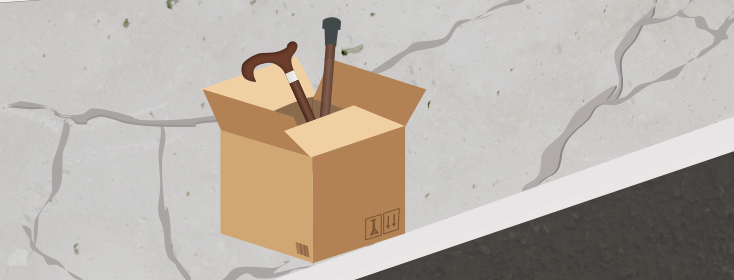The Upside of Being Abandoned
Of course, there is no upside to being kicked to the curb in the beginning. It smarts like the dickens. It’s outrageous, too, let’s face it. It’s so easy to feel self-righteous when I am clearly the innocent, injured party. And it hasn’t just happened once. In fact, I’m not sure where abandonment and rejection began since it can take so many forms. But if I narrow it down to romantic situations and potentially romantic scenarios with MS being near the center of the conflict, those started six years ago. Please know that I’m heading towards a very specific place with this piece. A positive place.
My spouse's resentment
In my December 4, 2012 essay titled: It’s Complicated, I describe the jarring take-down that ended my two-year marriage from a spouse that, despite knowing I had MS, had ardently pursued me in the beginning like a smitten schoolboy, then did a 180 and despised the ground I walked on six years later. His carefully hidden resentment of my broken body hit such a high pitch that he could no longer cover his true feelings. A big part of me felt deeply sorry for him. It can’t be easy to be labeled the putz that dumped his disabled wife. Whenever I run into him around town these days, he wears his shame valiantly. And he’s very nice to me. I am a very forgiving person. I can always see the other side of things. For example, even after I read his online dating profile post-separation and saw that he’d adamantly written that she must be healthy and active, and that life shouldn’t be lived on the sidelines. Ouch. I took it very personally at first, but it wasn’t meant that way. He must have been terrified of making the same mistake twice.
It makes some kind of sense to me now
It makes some kind of sense to me now, to emphasize physical robustness as a requirement even though he was in his fifties, a time of life when our bodies soon start failing us all. I’m wise enough to know that everyone has preferences, and it’s okay to not want to be involved with a disabled person. Looking back, he should have ended our relationship around the time he proposed marriage four years into our relationship, plenty of time to figure out whether you want to make a commitment. But it is indeed complicated whenever you feel love and hate and confusion and at the same time know that you really want an activities partner, not a sedentary spouse with a cane. Let’s face it, not everyone has the stomach or the patience for it. And that’s okay. Although the best thing is to know thyself and choose a partner accordingly, a lot of us don’t— including me. My own judgment really blows, and that leads to anger and self-pity.
Being open to growth
Not that there’s anything wrong with that, truly. I do highly recommend wallowing in self-pity from time to time. It serves a valuable purpose. It is how I access my pain and allow myself to feel it. I worry that people who refuse to indulge in self-pity might be denying themselves the experience of truly embracing pain, thereby losing their fear of it. I’ve lived it so many times I know I won’t die from it. It hardens me, casts me adrift for a time, but I am not lost for long. Anger and self-pity do not thicken my skin, however. It’s as thin as it ever was. Thinner, even. Anger and self-pity embitter me. But I am still soft inside. The soft side won’t disappear because I won’t let it. And bitterness? I embrace mine, it’s not a bad thing, either. Bitterness means I’ve lived through hate and injustice, abandonment and rejection at the hands of some selfish, shallow people. I am deep and always at the ready to learn from my experiences. Being introspective and ready to doubt myself keeps me open to growth.
Gaining independence and self-confidence
So what’s been the biggest pay-off, the uppest upside of abandonment? True independence and self-confidence. It’s kind of crazy. Left to live alone for the first time in my life at a time in my life when I was (gulp) at my most disabled? It was the best thing that ever happened to me. I can mostly take care of myself and have learned to ask for help when I really need it, guilt-free. In a marriage I always felt shame whenever I was helped. And worry, worry that I’d pay a price for that imposition one day. It turned out to be true. The cost of imposing on a spouse was to lose the spouse all together. No more nightmares about that, no more shame or guilt or worry. No spouse to lose now. My boyfriend doesn't live with me and I'll never allow it. It does make a difference.
My only wish is that I don’t have a need for anyone for anything. I don’t mean I want to drop off the grid and be a hermit. I only mean that the people in my life would be there because I want them to be. Not because I need them.
Remember that song from Funny Girl that goes: People/People who need people/Are the luckiest people in the world?
I used to believe that. Now, not so much. Do you?

Join the conversation